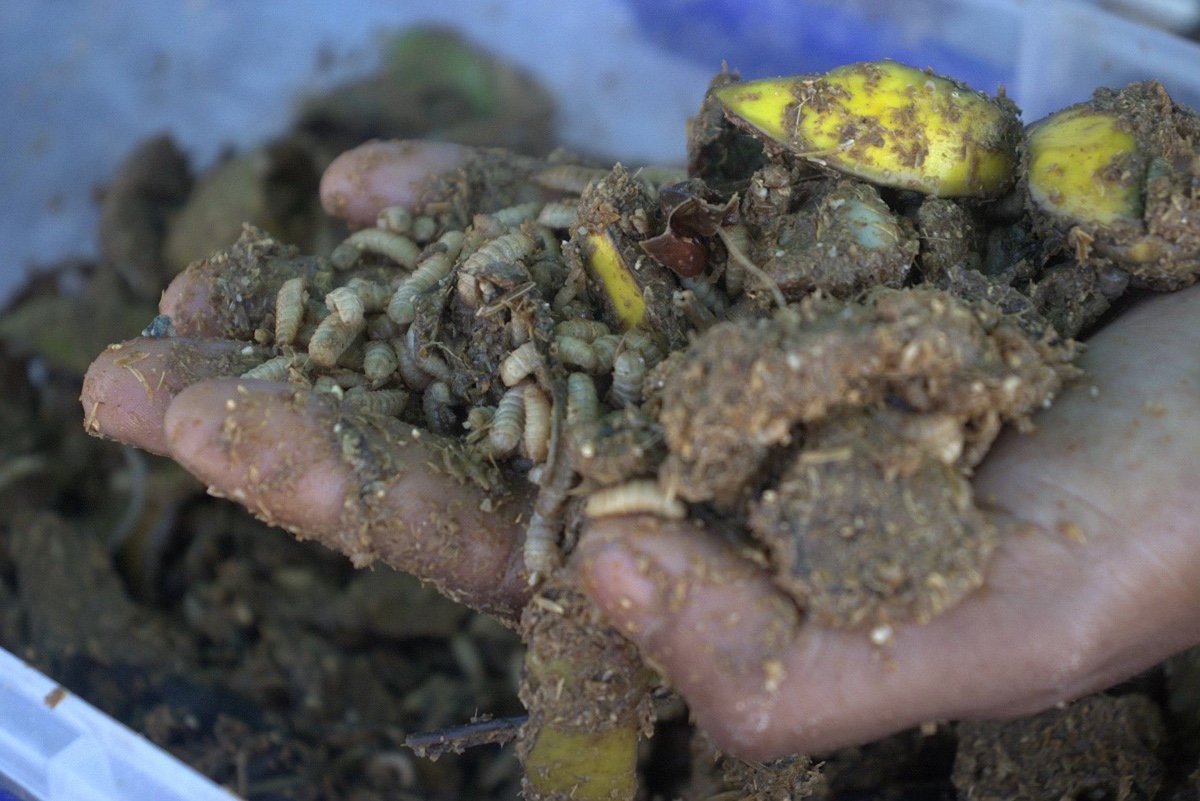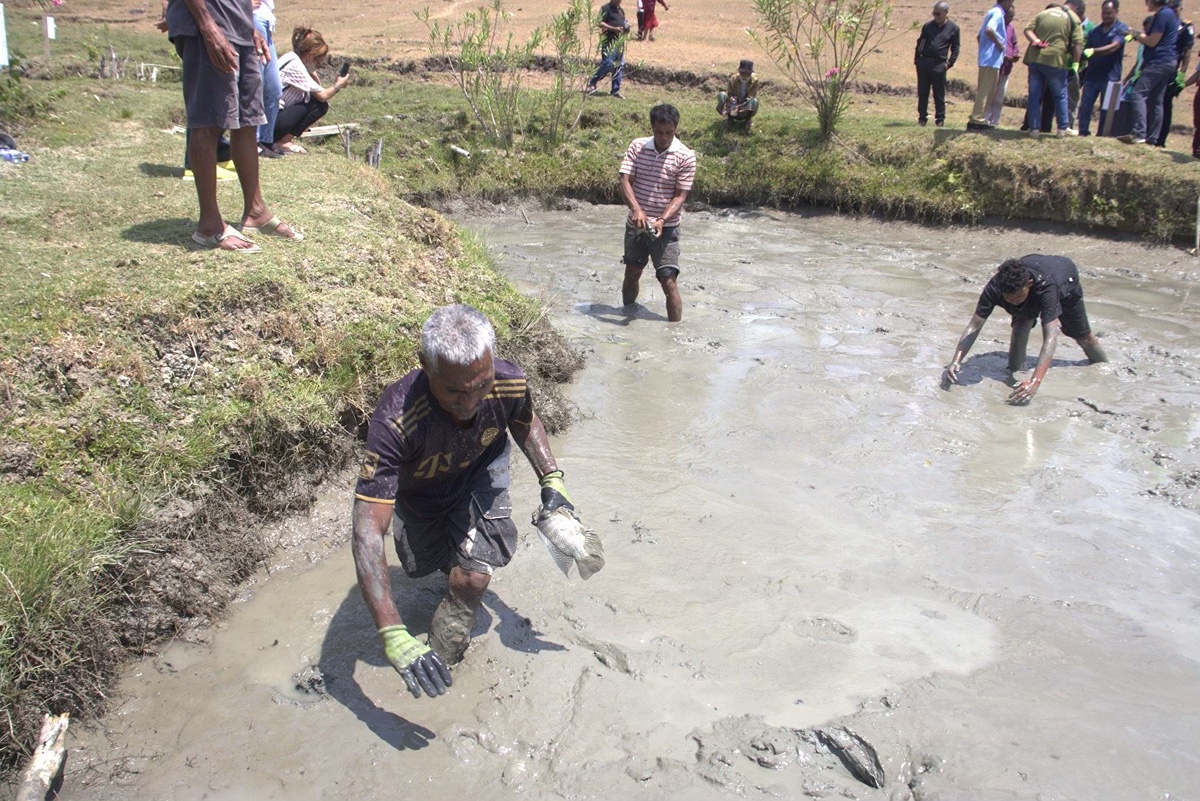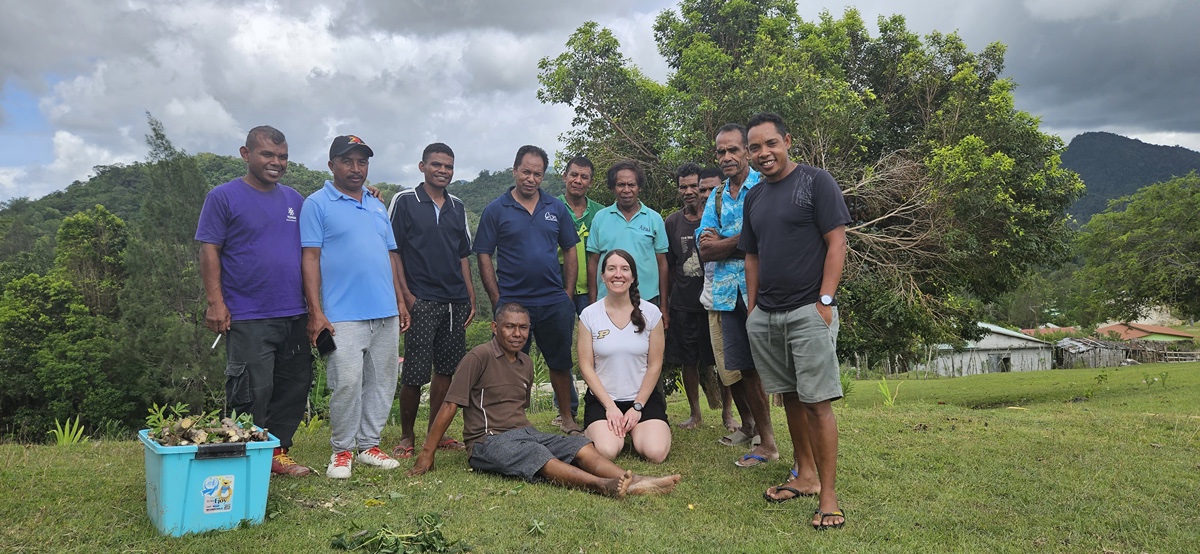Revolutionizing waste: How black soldier flies transform food waste into sustainable solutions
With food waste being a growing problem around the world, finding innovative solutions is more important than ever. Enter the black soldier fly, a tiny insect that holds the potential to revolutionize waste management and animal feeding practices.
Laura Ingwell, assistant professor of fruit and vegetable pest management in Purdue's Department of Entomology, describes this insect as a game changer in composting, offering a faster, safer and more effective way to transform organic waste into valuable resources. By exploring the relationship between waste reduction and livestock nutrition, Ingwell's research suggests a path toward sustainability that benefits farmers and the environment.
Black soldier flies can be found on every continent except Antarctica and are holometabolous, meaning they go through a complete metamorphous. “You have adult flies which are recognizable, and people know what a fly looks like, but they lay really small, white translucent eggs,” Ingwell explains. “Those eggs hatch into what we call larva, or for flies, maggots. They spend most of their life in this maggot stage, and that’s where they’re doing a lot of eating and growing and transforming into the adult stage. They are what we call detritivores: they consume dead, decaying organic materials.”
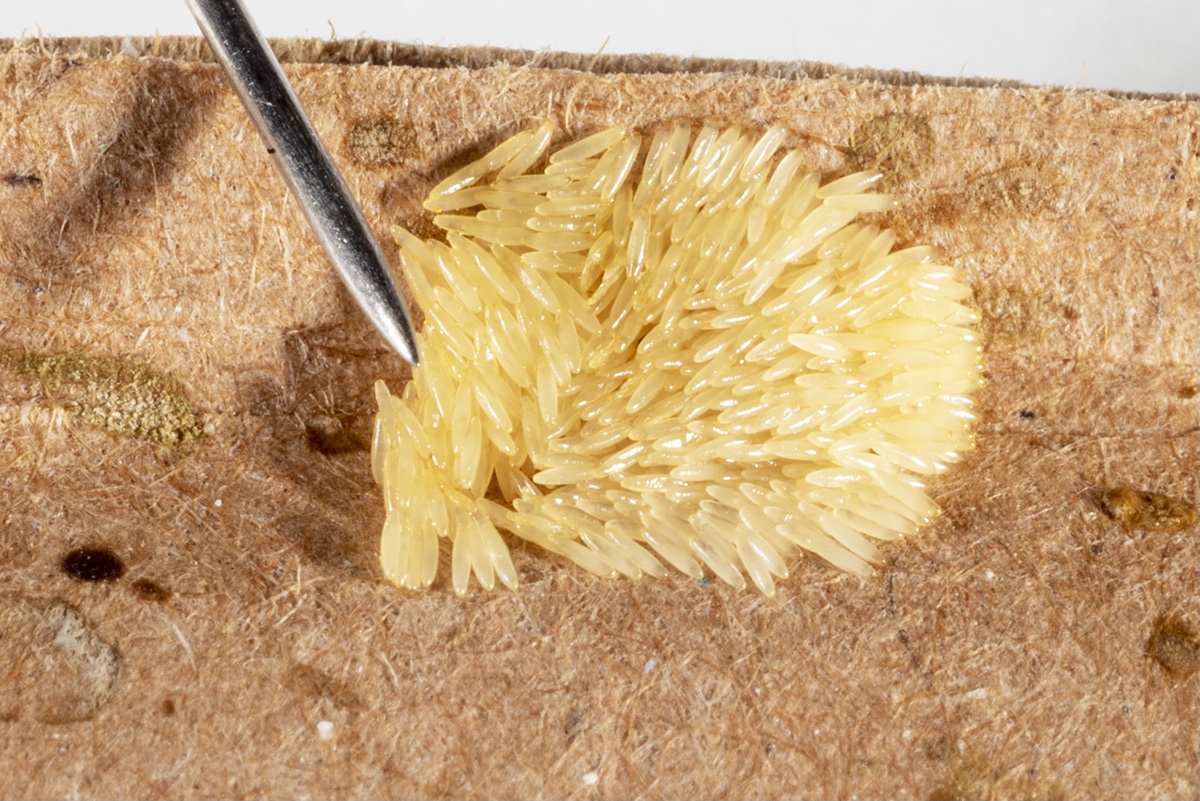 A close-up of a cluster of eggs that have been laid in the cardboard egg trap. (Photo credit: John Obermeyer, Purdue Entomology Extension)
A close-up of a cluster of eggs that have been laid in the cardboard egg trap. (Photo credit: John Obermeyer, Purdue Entomology Extension) 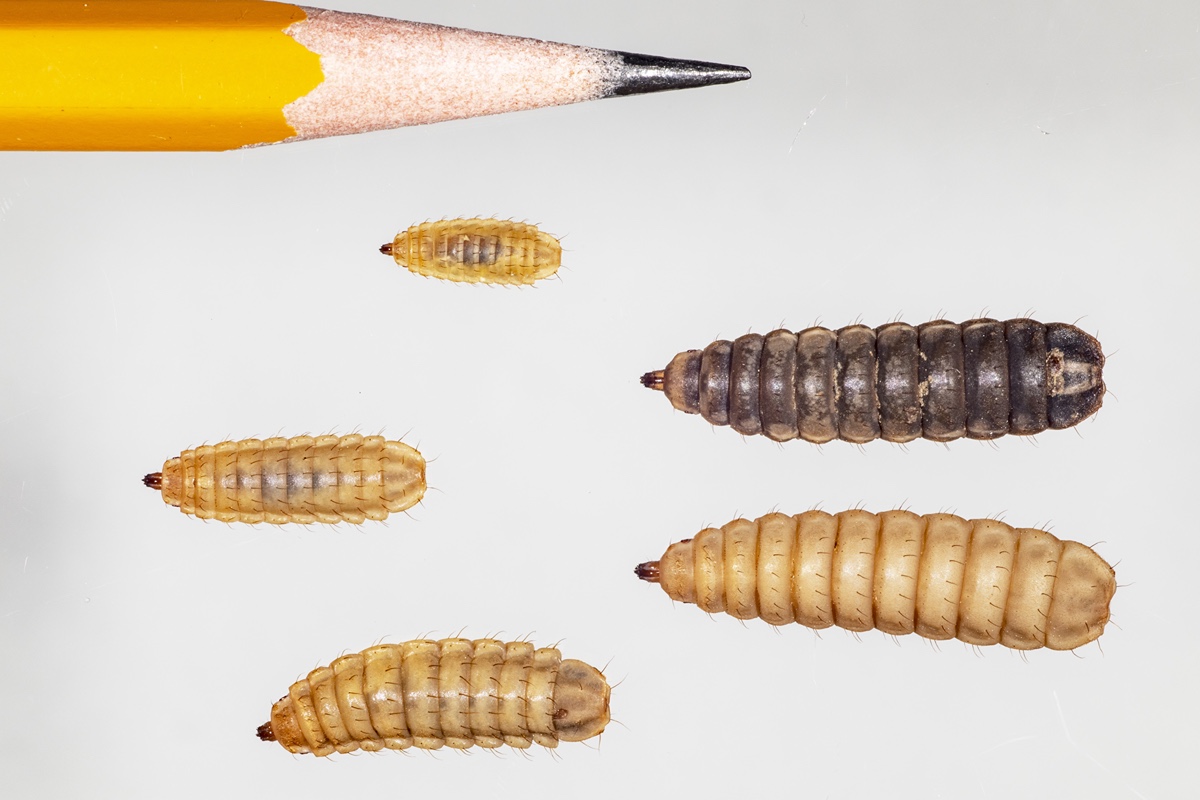 This photo depicts the larval stages of the black soldier fly, those that are consuming the organic waste and creating compost. The dark brown one is when they stop feeding and transition to a pupa. They are harvested as feed at that point or just before. (Photo credit: John Obermeyer, Purdue Entomology Extension)
This photo depicts the larval stages of the black soldier fly, those that are consuming the organic waste and creating compost. The dark brown one is when they stop feeding and transition to a pupa. They are harvested as feed at that point or just before. (Photo credit: John Obermeyer, Purdue Entomology Extension) Ingwell's research shows these insects not only eat a lot, they also complete the composting process very quickly. “The amount of waste this tiny fly can produce from its work is vast,” according to Ingwell. "Say we have one gram of eggs from the flies, similar to a small water bottle lid full. That small amount can consume around 5 kilograms of organic waste from the time they hatch until they are ready to become an adult and are done feeding."
Ingwell explains that in traditional composting, which is often used to combat food waste on small farms, you rely on bacteria and fungi to break down material – but there are limitations.
"We advise against placing meat and dairy, as well as cooked foods, into traditional composting. The process is so slow that you can get harmful pathogenic bacteria present or unwanted visitors such as racoons, skunks, and opossums pillaging the pile," said Ingwell. "We open a whole new world of waste solutions when introducing the black soldier fly to backyard composting and beyond. These flies eat so quickly there isn't an opportunity for those pathogenic bacteria or fungi to colonize. If they are present, research has shown that soldier flies also eliminate them through their feeding process”
Ingwell notes that black soldier flies also remove pesticide and pharmaceutical residues. “If you put pesticides into the food, the soldier flies denature the chemicals. Researchers have looked at residues of pharmaceuticals in municipal water streams, and those pharmaceuticals are broken down through that feeding process of the black soldier fly.”
Ingwell notes that using insects in food is not a novel concept. Still, the integration of waste reduction and the lifecycle process of the black soldier fly certainly is.
"A small farm I work with in Indiana has backyard chickens, so they use the flies that are developing from their compost to feed their chickens,” said Ingwell. “In this way, waste is being used to feed the fly, which in turn is feeding the animals on that very same farm."
Ingwell has focused much of her work on Indiana's small and urban farms. The one caveat? In the Midwest, it gets too cold for black soldier flies to survive the winter, so she helps farmers by seeding their pile early in the spring with flies from a colony she maintains in a greenhouse at Purdue.
Recently, Ingwell received a grant in collaboration with The Ohio State University to develop a composting bin system to increase winter survival for the black soldier flies. "We are looking to create something more buffered from the elements so people could continue composting throughout the year,” said Ingwell.
The research, which focused on a system that can endure colder temperatures, includes a collaboration with Amanda Deering, associate professor of produce food safety in Purdue’s Department of Food Science, and Laramy Enders, associate professor in Entomology.
"Amanda will research the food safety aspects of applying the compost to food crop production and feeding the larva to livestock and pets. With Laramy, we will look at the microbial diversity associated with the flies, compost and plants produced in soil amended with the compost," said Ingwell.
As the work continues to grow, Ingwell remains inspired by an international trip she was invited on a few years ago, where she learned just how impactful these tiny flies could be in the lives of farmers and their communities. The Catholic Relief Service tapped Ingwell when fish farmers in Timor-Leste, a country in Southeast Asia, reached out, struggling to get feed for their fish.
“The local people had noted they had a problem feeding fish in the systems. I worked with a colleague from Australia to confirm that black soldier flies had been recorded on the island of Timor Leste; then I knew we could train them to catch them in the wild and get them into cultivation. I instructed them to recognize, feed, and bait them from the wild,” Ingwell said.
Ingwell partnered with Purdue-based Scientific Animations Without Borders (SAWBO) to create specialized training videos on capturing and raising black soldier flies, available in English and Tetum, the national language in Timor Leste.
"It is a full circle moment for farmers in this remote part of the world. The farmers are growing the flies using their farms' food waste, garden waste and animal manure. When they slaughter an animal, they can use the blood and other parts that cannot be consumed to feed the flies and, in turn, grow their fish, which feeds their family and their communities. The fish are thriving, growing faster and larger as a result of the work," Ingwell said.
There is power in these tiny soldier flies, and it is an exciting time to see the benefit we can provide to our farmers not only here in Indiana but around the world as we continue to search for ways to reduce waste safely while also producing a new protein source.
- Laura Ingwell, assistant professor of fruit and vegetable pest management in Purdue's Department of Entomology
This research is a part of Purdue’s presidential One Health initiative, which involves research at the intersection of human, animal and plant health and well-being.

